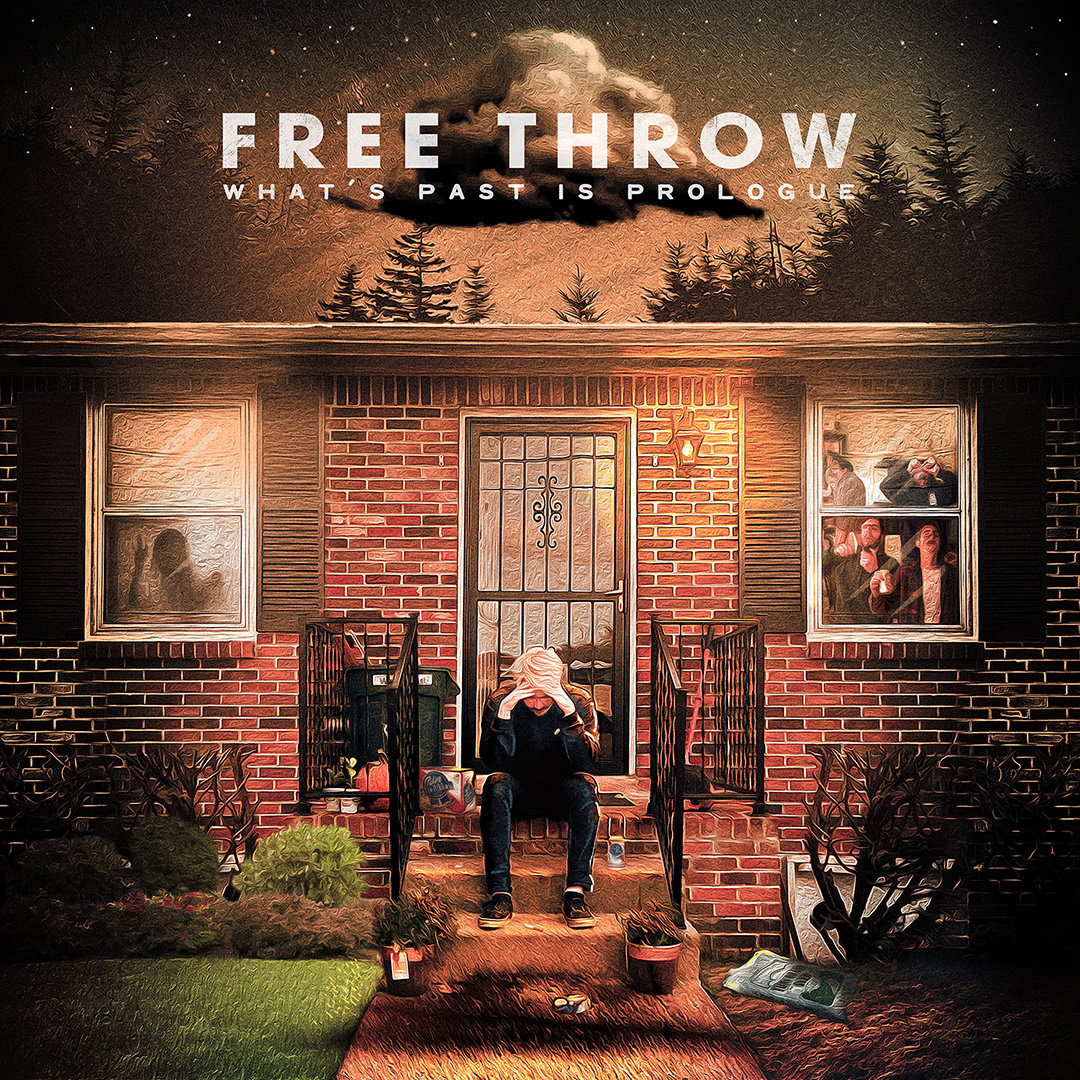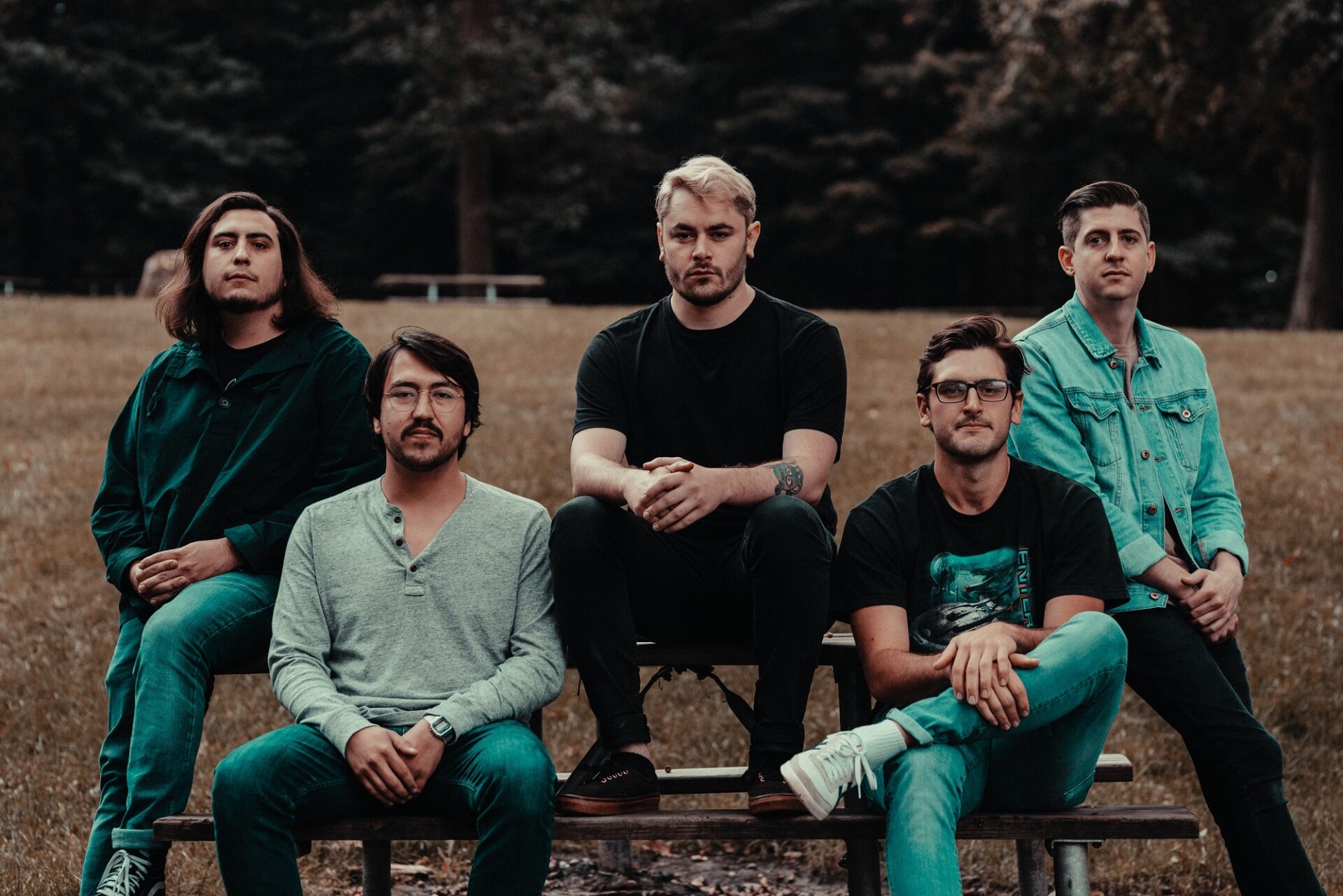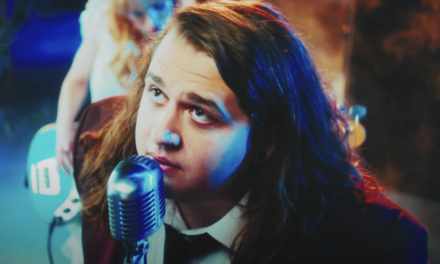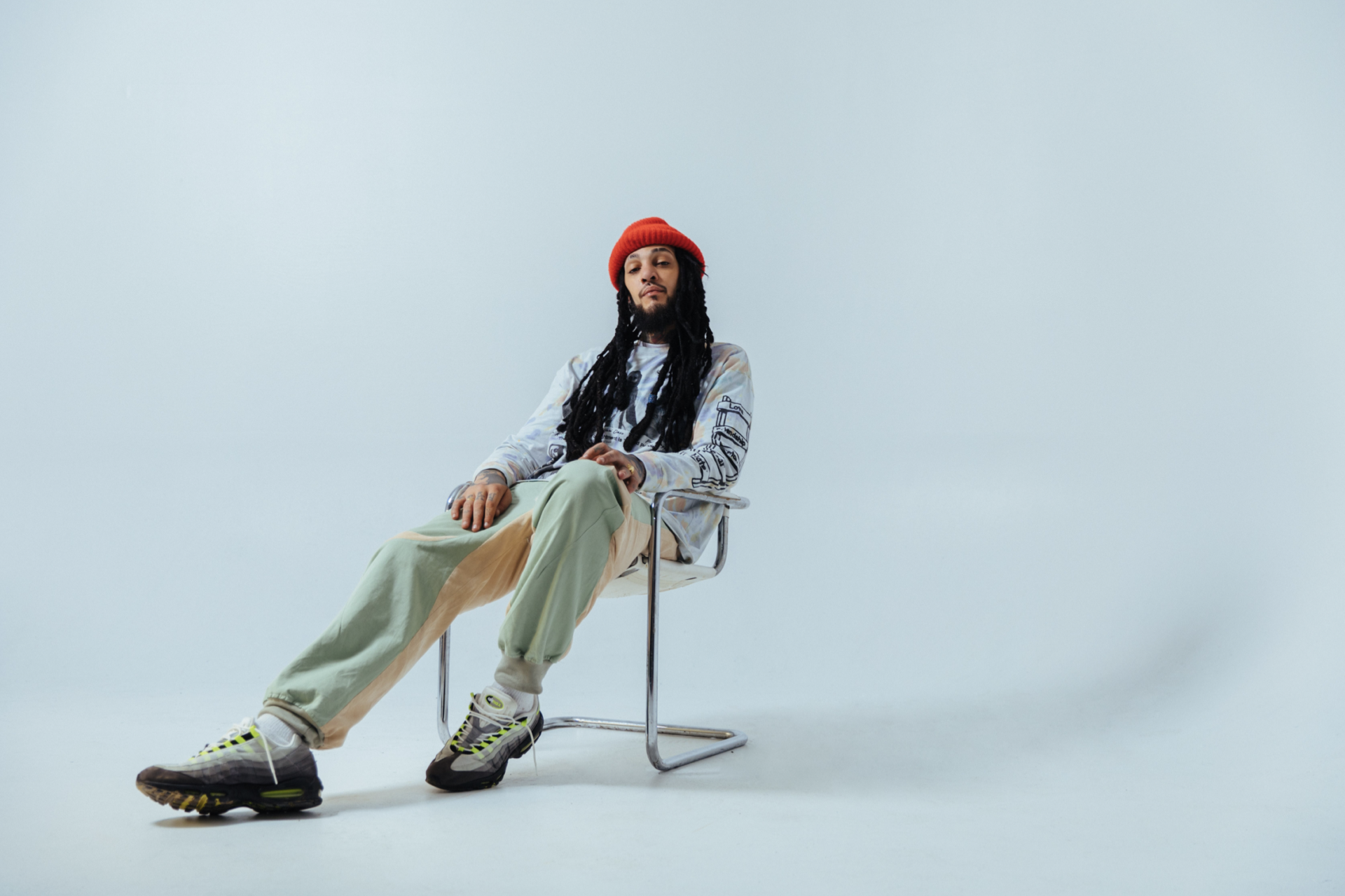“Had my first smoke in four years today / I wasn’t thinking about my voice / Or the things that my poor mother would say / If she found out that I made this choice.” That’s how Free Throw’s Cory Castro begins “Smokes, Let’s Go,” the first song on the band’s third record, What’s Past Is Prologue (out March 29 on Triple Crown Records). It comes as an admission of defeat, and an awareness that something is wrong – although what exactly it is isn’t clear just yet.

Cory Castro is no stranger to writing about his mental health, but while 2017’s Bear Your Mind was about redemption and saw him “speaking from the void”, falling deeper in to his struggles with anxiety and body image and abusing vices to self-medicate, this time, he’s able to step back and reflect. What’s Past Is Prologue picks up where Bear Your Mind left off: following a rough break-up, Castro found himself falling in to “this deep, dark mental state” that he was “the worst point I’d ever been at in my life.” From there, What’s Past Is Prologue tells the story of how he climbed out of that point and began to feel human again, as he shifts the blame of his issues to his breakup, before realizing it was his own issues that caused the stress, leading him “to dive deeper in to things like alcoholism,” and eventually, getting help.
Free Throw are no strangers to using video game and other nostalgic references in their music (“Better Have Burn Heal,” on Bear Your Mind, takes its name from a Pokemon reference); What’s Past Is Prologue came from a monologue Castro heard in a Metroid game. As Samus Aran reminisced on what his life has come to, he uses the term “what’s past is prologue”; that immediately connected with what Castro was trying to get across with the album. Looking back on his journey in mental health, he realized that “what has happened before is just prologue to what is happening ahead of me.”
The beginning – “Smokes, Let’s Go” – and end (the closing of “What’s Past Is Prologue”) – came first; from there, Castro began piecing bits of the story together so that the songs could, in order, “represent what I wanted it to in the correct way.” On track seven, “Today Is Especially Delicious,” he finds himself at a turning point: realizing he’s been “drinking for breakfast,” he questions himself, asking, “Is this what I had planned for my life?”. The turning point came when Castro realized he “had been getting worse, as a person.” He admits that he “was not fun to be around,” and tour was getting harder as he was drinking to self-medicate his problems with depression and anxiety. After one show in which he’d gotten drunk and didn’t play as well as he wanted to (“I’ve seen videos of the show since, and it really wasn’t that bad,” he realizes now), “I was so upset with myself.” He pulled his younger brother (and Free Throw’s bassist), Justin, aside, and said, “Dude, I need help – I gotta figure this out. Something is wrong, and I don’t know what to do. I’m freaking out. When I get home, I need help.” The latter half of the record is “ultra-reflective,” as he realizes he needs help. When they got home from that tour, Castro stuck to his word: he saw a psychiatrist and started a new medication, which set him on a path to a better mental place.
Getting better isn’t always easy, and sometimes the things that are supposed to help can seem to make matters worse. On Bear Your Mind, Castro explored the difficulties of finding the right medication (“Better Have Burn Heal,” “Andy And I, Uh”). While he had reservations going into it this time, he was committed to turning his life around and told himself that if one option didn’t work, he’d try something else. “And ultimately,” he says, “it came through. I feel so much better now. I feel like I’m a much more pleasant person to be around; tour is a lot more fun. I’m starting to find my love for touring again, which is nice, because for a while there I was starting to dread going on tour ’cause I would be away from the comfort of home, and being in that mindset and being out of your element every day, it’s just not the best.”
This week, Free Throw will begin a tour with Tiny Moving Parts and World’s Greatest Dad; after the tour wraps in Iowa City in April, they’ll drive right back across the country to begin a tour with Seaway, Heart Attack Man, and Young Culture, which will stretch through the second week of May. Touring for a long time can be isolating. Not only does it mean being away from your loved ones, it’s easy to get locked into the routine of tour: “you drive all day till you get to the venue, you load in, then you get maybe an hour or two before you have to start doing a bunch of stuff, so you walk around a bit.” To avoid that isolation, Castro likes to go out and explore, whether that means sight-seeing, checking out a nearby donut shop, or finding a sports bar to watch a game. Breaking out of his routine to see what’s going on in the city they’re in helps get his mind off of “the whole touring scenario”, and prevents what he and his brother call “green room sickness”: “where you’re in green rooms so much that you tend to forget the outside world even exists.”
On the penultimate track, “Cerulean City,” Castro realizes that “This house doesn’t have to be haunted anymore.” Now that he’s in a better mental place, Castro can think – and write – more clearly. As he looks back into the depths that he wrote from on Bear Your Mind, he’s able to “say things a lot better than I would have when I was right smack dab in the middle of it.” He compares it to the calm discussion you might have following a heated argument: in the moment, “you’re gonna say things that are just right off the top of your head, you’re gonna say what you have to say”, but when you look back on it the next day, “you’re like, ‘Oh, well I could’ve said that a lot better – I was conceited.'” If Bear Your Mind is the heated argument, What’s Past Is Prologue is Castro stepping back to reflect in that calm discussion later on.
Amid self-reflection as he works on getting better, on “Monte Luna,” Castro explores his struggles with insomnia. Though he was making a change and actively working on improving his mental health to get back to normal, he still struggled to sleep. Sleep problems like sleep paralysis are a recurring theme on Free Throw’s records, but insomnia was “a whole new thing for me.” When he’d be lying awake, he would start drinking “because I was awake and I didn’t know what else to do. It was one of the obstacles I had to overcome.” Nowadays, he still drinks, though it’s mainly on the weekends with friends, rather than self-medication on a daily basis. Finding a balance can be hard, but Castro feels his issue wasn’t being addicted to alcohol so much as needing something, anything, to quell his anxious feelings. Once he got a handle on his anxiety, the need to “just start getting drunk all the time” went away, and alcohol became “something I do socially.”
Discussing how supportive his brother was when he opened up to him, Castro says he and Justin are “like best friends… he’s seen me go through pretty much everything.” Castro is normally “a pretty headstrong person” who does things on his own, so when he came to his brother and was “so upset with myself, I had hurt myself more than I had done anything to anyone else”, his brother saw that he was serious, and was “very supportive.” He’s also grateful for how the rest of his bandmates “put up with me and encouraged me”: when Castro decided he needed help, they were understanding and gave him time to figure things out. Castro admits that when things were rough, “I’m sure I pissed them off more times than they’ll ever want to admit,” but he’s glad they put up with it and stuck with him.
Everyone has a sense of pride, and “the hardest thing to do is admit to yourself that something is wrong with you.” Mental illness is as much of a health issue as any other type of illness – “it’s an issue just with your brain instead of, say, your heart, or your joints, or anything like that. It’s a part of your body as well” – and just like in dealing with other health problems, “you do kind of have to be an adult and… figure out what you have to go.” While it’s important to acknowledge the stigma against mental health, ultimately, “It’s just like anything else that you have to take care of. If you’re sick… it’s your responsibility to take care of yourself.”
Some listeners may not understand or like the music itself, but Castro is eager to answer questions about What’s Past Is Prologue. He hopes that people who hear it will open up a dialogue. When his anxiety was at its worst, he reveals that he “was kind of hating situations where I’d have to sit and talk about what the record was about.” Now, for the first time, he’s looking forward to talking about it, because “it’s something that I feel very strongly about. I’m glad that I can allow people to hear my story, and hopefully, it will encourage or give them something that they can relate to, in a way, ’cause I know whenever I was going through my worst time, finding something to relate to was not as easy as I thought it would be.”
Castro has always done interviews for the band (“you get good at it after a while,” he says). He reflects on a 2017 interview with Circles & Soundwaves as one of his favorites, which he still looks back on when thinking about Bear Your Mind. However, answering the same basic, surface-level questions gets repetitive, and when he was in the midst of his mental health struggles, answering routine questions was “the last thing I wanted to do.”
What’s Past Is Prologue ends with its title track. Finally learning to love himself, “What’s Past Is Prologue’s final verse sees Castro throw his cigarettes away: “I could feel my lungs rejoice / I’m finally breathing again,” he sings. Wrapping up the conversation, Castro shares, “No matter what’s happened in the past, you can still be a better you. If you feel like you’re not as good of a you as you can be, you can still be a better you.” It can be easy to get lost in thoughts of things that have already happened, but things can get better, and everything we’ve done before is just getting us ready for what’s to come: “what’s in the past can always be just prologue to what’s in the future.”
Free Throw will be on tour with Tiny Moving Parts and worlds greatest dad from March 27 – April 13; they’ll be on tour with Seaway, Heart Attack Man, and Young Culture from April 18 – May 11. All tour dates can be seen below. Visit www.FreeThrowBand.com for tickets and to pre-order What’s Past Is Prologue.
Free Throw Spring 2019 Tour Dates
MAR 27 – Raleigh, NC @ Kings
MAR 28 – Richmond, VA @ Richmond Music Hall
MAR 29 – Amityville, NY @ Revolution
MAR 30 – Hamden, CT @ Space Ballroom
MAR 31 – Providence, RI @ The Met
APR 2 – Portland, ME @ Port City Music Hall
APR 3 – Burlington, VT @ Higher Ground
APR 4 – Portsmouth, NH @ The Press Room
APR 5 – Montreal, QC @ Bar Le Ritz PDB
APR 6 – Ottawa, ON @ The 27 Club
APR 7 – London, ON @ Rumrunner’s
APR 8 – Buffalo, NY @ Mohawk Place
APR 10 – Newport, KY @ The Southgate House Revival
APR 11 – St Louis, MO @ Old Rock House
APR 12 – Bloomington, IL @ The Castle Theatre
ARP 13 – Iowa City, IA @ Blue Moose
APR 18 – Rochester, NY @ Montage Music Hall
APR 19 – Poughkeepsie, NY @ The Loft at The Chance
APR 21 – Worcester MA @ Palladium Upstairs
APR 23 – Brooklyn, NY @ Brooklyn Bazaar
APR 24 – Lancaster, PA @ Chameleon Club Lounge
APR 25 – Baltimore, MD @ Metro Gallery
APR 26 – Virginia Beach, VA @ The Bunker
APR 27 – Charlotte, NC @ Ames Southend
APR 28 – Columbia, SC @ New Brookland Tavern
APR 30 – Jacksonville, FL @ 1904 Music Hall
MAY 1 – Nashville, TN @ Exit/In
MAY 2 – Columbus, OH @ Ace of Cups
MAY 3 – Milwaukee, WI @ Back Room at Colectivo
MAY 5 – Chicago, IL @ Subterranean
MAY 6 – Burnsville, MN @ The Garage
MAY 8 – Grand Rapids, MI @ The Stache
MAY 9 – Indianapolis, IN @ The Hoosier Dome
MAY 10 – Toledo, OH @ Frankie’s
MAY 11 – Lakewood, OH @ Mahall’s













